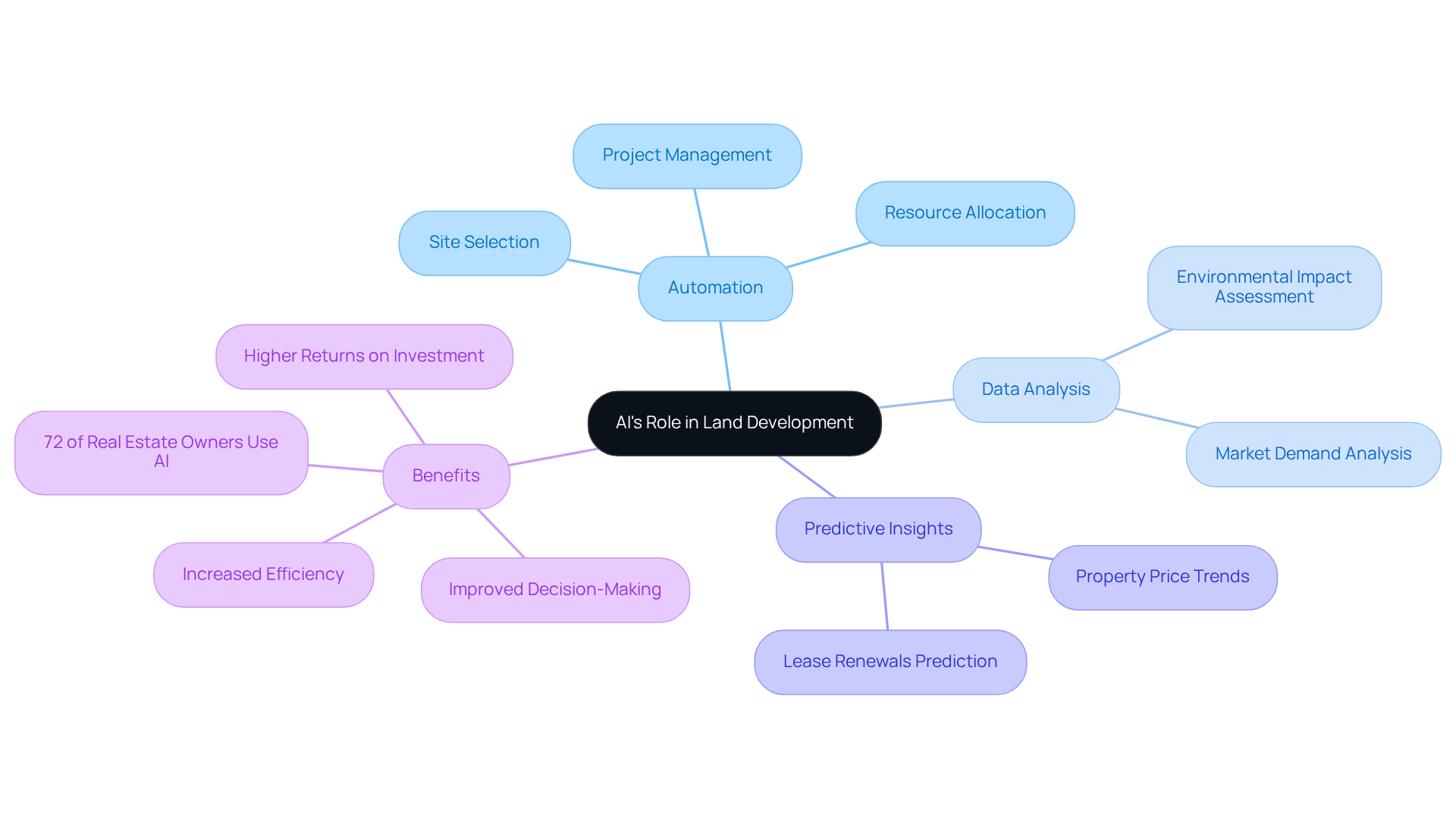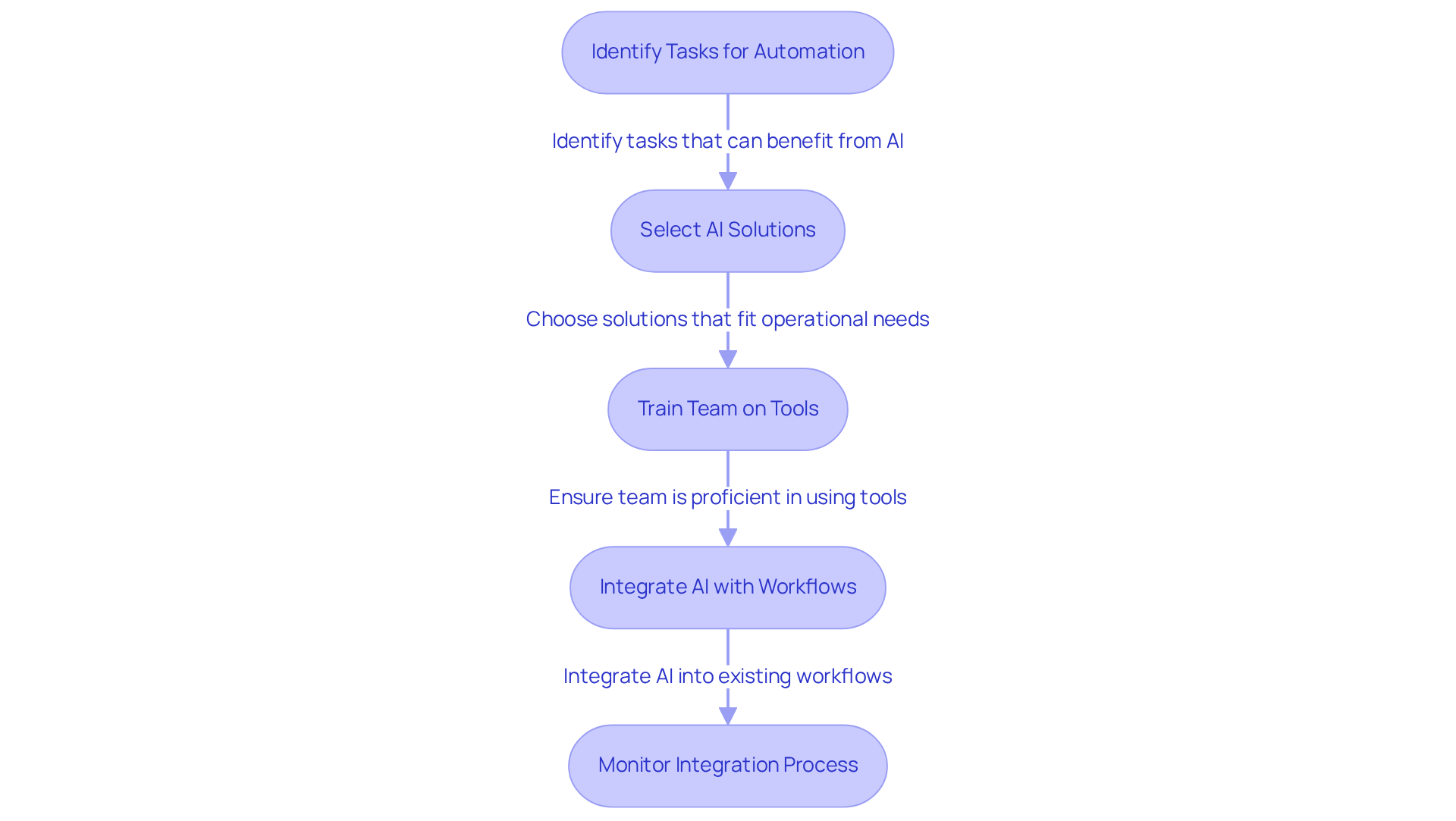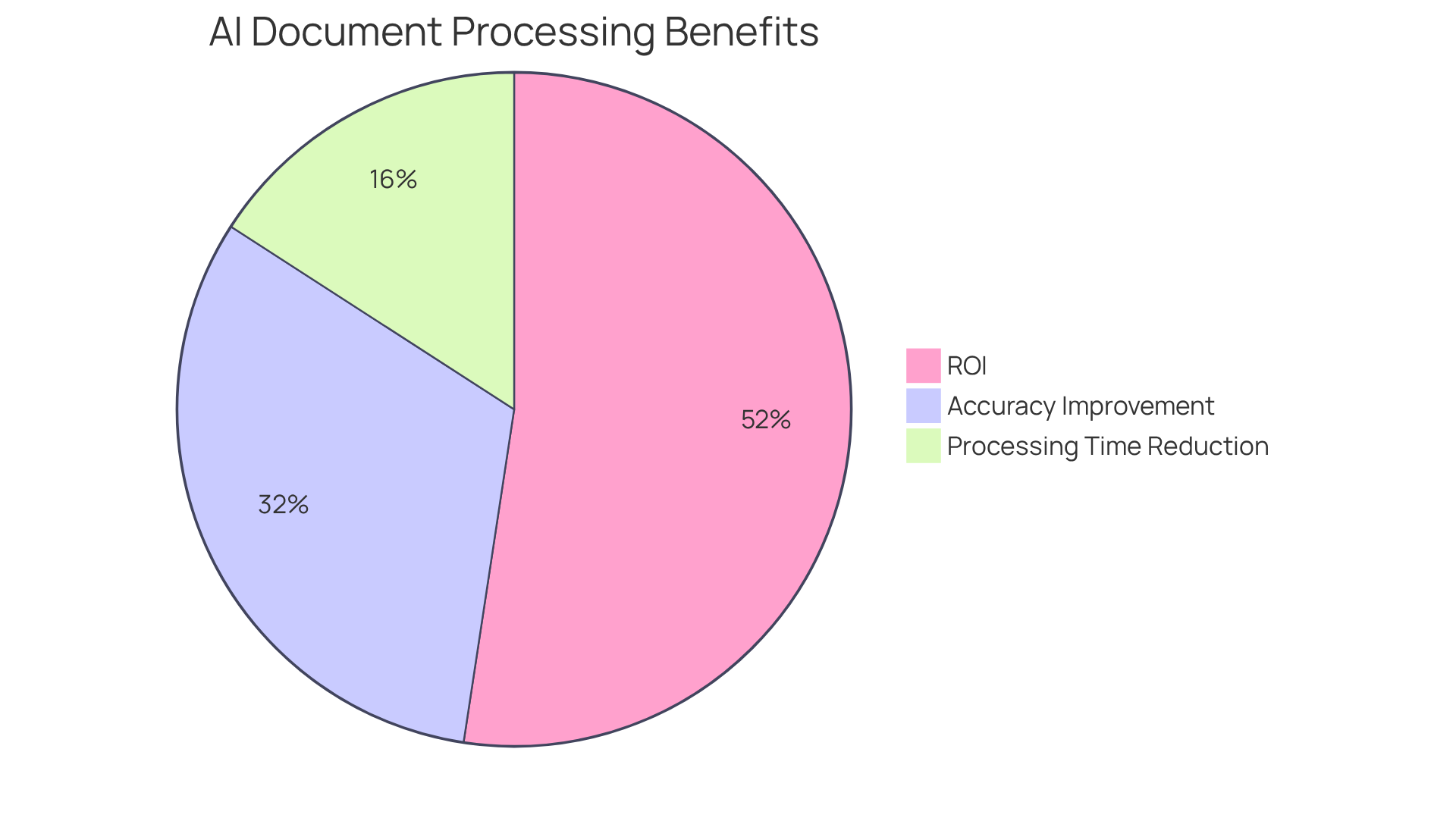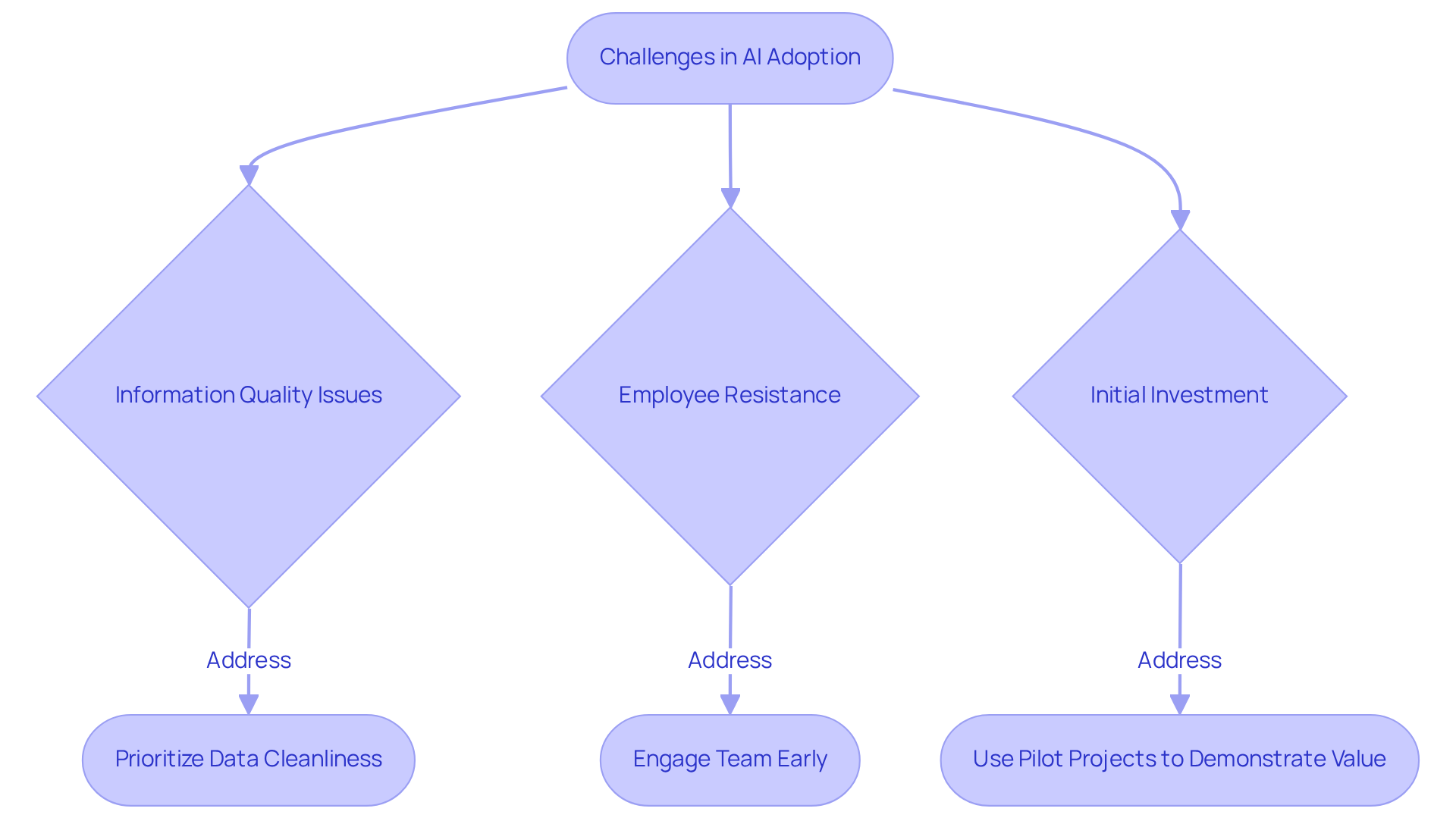Overview
AI plays a crucial role in assisting land developers by automating complex tasks, analyzing large datasets, and providing predictive insights. This significantly enhances efficiency in title research and project management. The importance of accurate title research cannot be overstated, as it lays the foundation for successful projects. However, developers often face challenges in site evaluations and document processing. Fortunately, AI not only accelerates these processes but also minimizes errors, leading to improved decision-making and ultimately higher returns on investment for developers. By integrating AI, developers can navigate these challenges with confidence, reinforcing the reliability of their solutions.
Introduction
AI is transforming the landscape of land development, offering unprecedented capabilities that streamline processes and enhance decision-making. With the ability to automate complex tasks and analyze vast datasets, AI empowers land developers to optimize site selection and improve project outcomes. However, as organizations increasingly adopt these technologies, questions arise about the challenges and strategies for effective implementation. How can land developers harness AI's potential while navigating the complexities of integration and workforce adaptation?
Furthermore, understanding the significance of accurate title research becomes crucial in this evolving landscape. As we delve deeper into the challenges faced by land developers, it is essential to explore the strategies that can lead to successful implementation and the benefits that AI brings to the table.
Understand AI's Role in Land Development
AI is revolutionizing land development, demonstrating how AI assists land developers through the automation of intricate tasks, the analysis of extensive datasets, and the delivery of predictive insights. This technology significantly enhances site selection, optimizes resource allocation, and streamlines project management. For instance, AI can assess environmental impacts and model land yields, enabling developers to make informed decisions swiftly. A recent study reveals that 72% of real estate owners now utilize AI resources for site selection, underscoring its increasing significance in the industry. Land developers can improve their workflows and achieve superior project outcomes by understanding how AI assists land developers.
As noted by Andrew Breeding, a Senior GIS Programmer, 'how AI assists land developers is demonstrated through AI site selection, which leverages data-driven insights to streamline the real estate development process.' The integration of AI not only reduces the time required for site evaluations but also minimizes errors, leading to a more reliable development process. Furthermore, with AI resources, teams can assess location data twice as quickly as conventional methods, ensuring that the appropriate properties are chosen for development. Consequently, this ultimately leads to improved returns on investment.

Implement AI Solutions in Your Workflow
To efficiently incorporate AI solutions into your workflow and understand how AI assists land developers, it is essential to identify specific tasks that can benefit from automation, such as heading searches and document processing. Parse AI offers advanced machine learning resources that significantly reduce the time required for title searches. This capability illustrates how AI assists land developers in managing a high volume of title inquiries without substantial increases in labor costs. Selecting AI solutions that align with your operational needs is crucial, particularly in understanding how AI assists land developers by leveraging machine learning and optical character recognition for enhanced efficiency.
For instance, Parse AI's example manager facilitates quick document annotation, allowing you to extract information from unstructured data, thereby streamlining your document processing. Comprehensive training for your team on these tools is vital to ensure they are both comfortable and proficient in their use, particularly in understanding how AI assists land developers. Furthermore, consider integrating AI and blockchain in document searches, as this combination enhances both security and efficiency.
Lastly, it is imperative to closely monitor the integration process, actively gathering feedback to refine and optimize how AI assists land developers in your operations. This proactive strategy will ensure that your team maximizes the advantages of AI in title research.

Utilize AI for Efficient Title Research and Document Processing
AI is revolutionizing ownership research and paperwork processing by automating data extraction from ownership records and identifying discrepancies in property documentation. Advanced AI-driven resources can swiftly analyze extensive datasets, flagging potential issues such as liens or missing records. For instance, Parse AI excels in extracting essential information from title files, enabling researchers to finalize abstracts and reports with remarkable speed and precision. This implementation not only accelerates workflows but also significantly reduces the risk of human error.
Statistics reveal that organizations utilizing AI for document processing can achieve accuracy improvements of nearly 99.9% across various document formats, while processing times can be cut by 50% or more. Furthermore, automating these processes can lead to substantial cost savings; studies indicate a return on investment of 30-200% within the first year and potential labor cost reductions of up to 30%. By leveraging AI technologies, title companies can enhance operational efficiency and ensure more reliable outcomes in their research efforts, demonstrating how AI assists land developers.

Overcome Challenges in AI Adoption for Land Development
The challenges of integrating AI in land development include issues related to information quality and employee resistance, as well as understanding how AI assists land developers alongside the necessity for substantial initial investment. To effectively navigate these hurdles, prioritize the cleanliness and organization of your data. AI systems rely on high-quality inputs to produce reliable outputs. Engaging your team from the outset is essential; provide comprehensive training and address any concerns to foster a culture that embraces innovation.
Organizations that have successfully integrated AI often initiate their journey with pilot projects, demonstrating the technology's value prior to broader implementation. This method not only mitigates resistance but also showcases tangible benefits, paving the way for a smoother transition to AI-enhanced workflows. Notably, 62% of employees express concerns about AI replacing their jobs, underscoring the necessity of communication and reassurance in fostering acceptance.
Furthermore, employees currently spend 28% of their workweek on repetitive tasks that could be automated, highlighting the significant efficiency gains possible through AI adoption. By proactively addressing these challenges, you can facilitate a more effective integration of how AI assists land developers into your operations.
Utilizing the Parse AI platform can greatly enhance your file processing capabilities. With advanced OCR technology, Parse AI reads, labels, and extracts vital information from documents, streamlining runsheet creation for landmen. The interactive labeling feature allows users to create custom labels and train models according to their specific requirements, ensuring that the extraction process is both customized and efficient. By employing these tools, you can improve data accuracy, reduce the time spent on repetitive tasks, and ultimately lead to a more productive workflow.

Conclusion
AI is fundamentally transforming the landscape of land development, offering unprecedented support to developers through enhanced efficiency and accuracy in title research. By automating complex tasks, analyzing vast datasets, and providing predictive insights, AI enables land developers to make informed decisions quickly and effectively. The integration of AI not only streamlines site selection and project management but also significantly reduces the time and errors associated with traditional methods.
Key insights from this exploration reveal that AI can drastically improve workflows in title research and document processing. With tools such as Parse AI, developers can automate data extraction and minimize human error, leading to faster turnaround times and substantial cost savings. Furthermore, the importance of overcoming challenges related to data quality and employee resistance cannot be overstated. Engaging teams through training and pilot projects is essential for fostering a culture that embraces AI technologies.
The implications of adopting AI in land development extend beyond operational efficiency; they pave the way for innovative practices that can redefine the industry. Embracing AI not only enhances productivity but also positions developers to better navigate the complexities of real estate. As the industry continues to evolve, leveraging AI solutions will be crucial for staying competitive and achieving superior project outcomes.
Frequently Asked Questions
How is AI changing land development?
AI is revolutionizing land development by automating complex tasks, analyzing large datasets, and providing predictive insights, which significantly enhances site selection, optimizes resource allocation, and streamlines project management.
What specific tasks can AI assist with in land development?
AI can assist with site selection, environmental impact assessments, modeling land yields, and improving project management processes.
What percentage of real estate owners are using AI for site selection?
A recent study reveals that 72% of real estate owners now utilize AI resources for site selection.
How does AI improve the site selection process for land developers?
AI improves the site selection process by leveraging data-driven insights, reducing the time required for evaluations, minimizing errors, and allowing teams to assess location data twice as quickly as conventional methods.
What are the benefits of using AI in land development?
The benefits of using AI in land development include improved workflows, superior project outcomes, and enhanced returns on investment due to more informed decision-making and efficient resource management.




